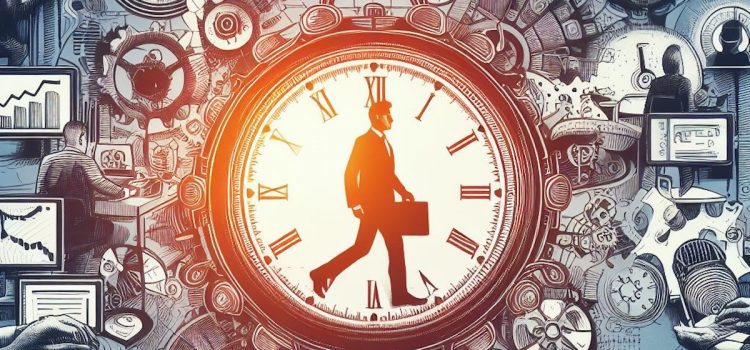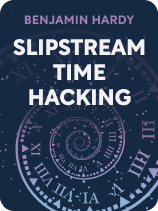

This article is an excerpt from the Shortform book guide to "Slipstream Time Hacking" by Benjamin Hardy. Shortform has the world's best summaries and analyses of books you should be reading.
Like this article? Sign up for a free trial here.
Can you actually make time go slower? Is time hacking merely theoretical?
Unlike wormholes and time travel, slipstream time hacking isn’t just a theory. Benjamin Hardy recommends practical steps for slowing time down that you can actually take.
Below you’ll learn how to make time go slower so you can progress toward your most important goals.
1. Zero in on Your Core Values and Goals
Hardy’s first piece of advice on how to make time go slower is to make choices that align with your values and move you closer to the goals that matter most. That requires gaining a clear understanding of what you value and want most in your life. When you start to think about your days in terms of the distances you can travel rather than the hours you can fill, you can more easily determine how it would be most meaningful to use your time.
For example, you might realize that one of your core values is spending time with your family and think about how frequently (or infrequently) you see your parents. You can do the “depressing math” to determine how much time you’ll likely spend with them if you continue to see them at your current rate. If you don’t like the results, you can choose to see them more often. You’re still looking at the same amount of time passing, but you’re figuring out how to use that time to do something you value: spending time with your family.
Hardy recommends identifying which of your goals are most important to you and putting aside everything else, including work that you find unsatisfying or tasks that you consider unfulfilling. You might need to put aside things that seem meaningful or fulfilling, too: Hardy contends that if you have more than three major goals, you need to narrow your focus. While this requires foregoing some opportunities, that’s a necessary part of pursuing your most important goals. Once you’ve identified your vision for your life, Hardy recommends committing to it wholeheartedly. But along the way, you shouldn’t be afraid to course-correct to keep yourself on track toward your goals.
2. Find Other People Moving in the Same Direction You’re Going
A second strategy to speed up your progress toward your goals is to find other people you can learn from and travel alongside. Hardy explains that this might involve finding a mentor or joining a group of people working to achieve goals that are similar to yours. You can enter the slipstream of these individuals or groups and look for wormholes along the way.
Traveling alongside people who are slowing time can also be helpful because not everyone will understand what you’re doing. Hardy notes that when you use slipstream time hacking, you’re departing from the status quo and acquiring knowledge or experiencing change at a pace that might feel unfamiliar to others in your life. Some people who don’t understand what you’re doing might try to discourage you. For example, people in Picasso’s time didn’t understand what he was doing in his paintings. But by developing Cubism, he pushed art forward at an incredible speed—even if people didn’t like how his paintings demanded that they look at art in a new way.
Hardy recommends that as you find your path, you should also seek out ways to help other people slow down time, too. He explains that the goal should be for everybody to slow time and live more meaningful lives as individuals and as a community. If we all work together, everyone can learn to slow time in their own lives. You can help others toward that goal by using your skills in slipstream time hacking.
3. Set Up Your Day to Help You Slow Down
A third step you can take to practice slipstream time hacking is to structure your days around the goal of slowing time. Hardy writes that many people hurry through their lives and spend their days rushing toward deadlines or goals. By letting this process consume their time and attention, they speed up their time rather than slowing it down. But you can avoid this pitfall by cultivating habits that slow time down every day.
Build Routines That Help You Get More Out of Your Time
First, Hardy recommends starting your day with a consistent routine. Sticking to a routine not only curtails the problem of decision fatigue—the phenomenon where making decisions depletes your mental and physical energy—but can also help you to focus on your most important priorities and start dilating time at the beginning of your day.
Hardy also advises building routines that enable you to experience “flow”—the state of mind where you become fully and purposefully immersed in a task, as explained by Mihaly Csikszentmihalyi in Flow—because, when you’re in this state of consciousness, time seems to slow down.
Don’t Let Tasks Demand More Time Than They Deserve
Second, Hardy advises that you should curb the tendency to spend too much time on tasks you could complete more quickly. Hardy explains that according to Parkinson’s Law, your work will take up all the time you allot for it. In other words, the more time you set aside for a task, the more time it will take. He also contends that if you think a task is unimportant, it will take a long time to finish it. Similarly, if you think a task is complicated, it will take longer to complete.
Hardy’s solution for our inefficiency with our time—in addition to working only on the most important tasks—is to stop setting expectations that make tasks take up more time than necessary. In other words, don’t set aside needlessly large chunks of time for tasks. He recommends breaking tasks down into smaller pieces that are easier to accomplish quickly.
Focus on Being Present
Finally, Hardy writes that it’s important to spend time every day focused on the people around you. Remember that the point of slipstream time hacking is to make your life more meaningful. One way to do that is to take advantage of the slowing of time to be more present with the people in your life. For many of us, one of the things we value most is the time we get to spend with our family, friends, and community. Slipstream time hacking can give you more of that time—but you have to be present and mindful to enjoy it.

———End of Preview———
Like what you just read? Read the rest of the world's best book summary and analysis of Benjamin Hardy's "Slipstream Time Hacking" at Shortform.
Here's what you'll find in our full Slipstream Time Hacking summary:
- That your far-off goals might be closer than you think
- How to buy more time by making time run slower
- Why you might want to apply Einstein’s theory of relativity to your life






